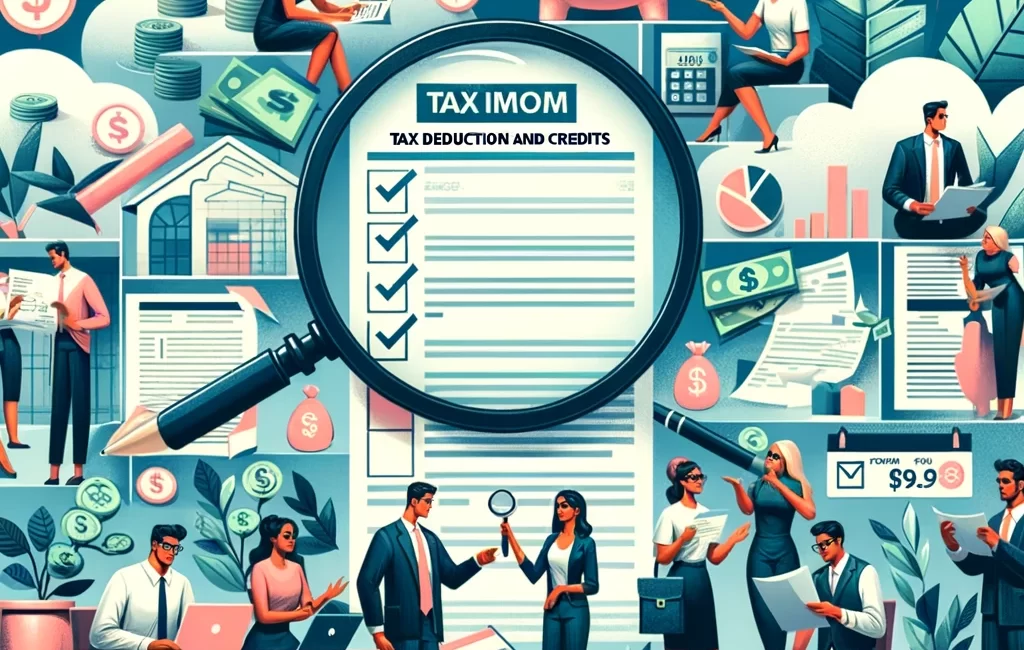In a world where tax burdens can seem overwhelming, smart tax planning is essential. For the year 2024, there are key strategies that can help you maximize your deductions and credits. Here, you’ll find an easy-to-understand guide, drawn from my experience in the tax field, to facilitate this process.
First, it’s vital to understand the difference between deductions and tax credits. Deductions reduce the amount of income subject to taxes, while tax credits directly reduce the amount of taxes you owe.
Strategies for Maximizing Deductions
Contributions to Retirement Accounts: Making the most of your contributions to retirement accounts such as 401(k)s or IRAs can lower your taxable income. Contributing to retirement accounts, like 401(k)s or IRAs (Individual Retirement Accounts), is an effective strategy for reducing taxable income. By contributing to these accounts, you’re lowering the amount of your income subject to taxes, which can significantly reduce your tax burden. This not only benefits you in the present with lower tax payments but also encourages long-term savings for your retirement.
Health Expenses: Keep track of all your health expenses. If they exceed a certain percentage of your adjusted gross income, they may qualify for deductions. Medical expenses can add up quickly, but many of them are deductible. If your health expenses exceed a specific percentage of your adjusted gross income, they may qualify for a deduction. This includes payments for medical treatments, surgeries, medical consultations, prescription medications, and medical equipment, among others. Keeping detailed records of these expenses is crucial to take advantage of this deduction.
Charitable Donations: Donations to qualified charitable organizations are deductible. Make sure you have receipts for all your donations, and making donations to charitable organizations is not only an act of generosity but also a way to reduce your tax burden. Charitable donations are deductible if made to qualified and recognized organizations. It’s important to keep receipts or any form of proof of these donations to validate the deduction during tax filing.
Leveraging Tax Credits
Earned Income Tax Credit (EITC): If you have low to moderate income, the EITC can be a valuable credit. Thresholds and amounts change annually, so stay informed.
Educational Credits: Regarding education-related deductions, there are several options available. The most common educational tax credits are the American Opportunity Tax Credit (AOTC) and the Lifetime Learning Credit (LLC). These credits apply to qualified educational expenses, such as tuition and school fees, and can provide significant tax relief. The AOTC is especially valuable for undergraduate students, while the LLC can be used by graduate students and those seeking to improve their job skills.
It’s important to note that educational tax credits have specific criteria that must be met, such as enrollment in an eligible educational institution and taking courses with the goal of obtaining a degree or improving job skills. Additionally, the AOTC and LLC cannot be claimed in the same year for the same student.
If you’re paying for college education, research credits such as the American Opportunity Tax Credit or the Lifetime Learning Credit.
Renewable Energy Credits: Energy-related tax credits have been significantly boosted by the Inflation Reduction Act (IRA). These incentives can cover up to 50% of the capital cost of qualified energy projects. Important changes include the ability to transfer some clean energy tax credits to third parties or receive direct payments from the IRS for certain tax-exempt entities and tribal and local governments. Available tax credits vary and can be carried back up to three years or forward for 20 years to offset tax liabilities in future years.
If you’ve made energy-efficient improvements to your home, you may qualify for tax credits.
Planning for Self-Employed Individuals and Small Business Owners
If you’re self-employed or own a small business, there are specific strategies such as:
Home Office Deductions: If you work from home, you may be able to deduct certain office-related expenses. These changes could affect both the definition of what constitutes a “home office” and the requirements for its regular use. Currently, to qualify for the home office deduction, a specific area of the home must be used continuously for business. However, these rules could be relaxed in 2024, allowing more taxpayers to benefit from these deductions.
Additionally, new categories for home office deductions are expected to be introduced, aiming to provide a more comprehensive and fair method of calculating these deductions. These new categories could include expenses related to technology and utilities specifically used for the home office, such as a separate internet connection or a dedicated phone line.
In terms of calculation methods, there are currently two options:
The Simplified Option and the Regular Method. The Simplified Option allows you to multiply a prescribed rate by the square footage of the area used for business, with a limit of 300 square feet and a rate of $5 per square foot (up to a maximum of $1,500). The Regular Method involves calculating the actual expenses incurred in operating the home office, including direct and indirect expenses. For 2024, the calculation process is expected to be more simplified and user-friendly, encouraging more taxpayers to take advantage of this benefit.
It’s important to note that, under current tax laws and until 2025, employees receiving a salary (W-2 employees) cannot claim home office deductions, while self-employed individuals who meet the criteria can.
Vehicle Expenses: Business-related vehicle expenses may be deductible. If you use your vehicle for business or commercial purposes, you can deduct certain expenses associated with its use. This includes costs such as gasoline, maintenance, repairs, and depreciation. Calculating this deduction can be complex, so it’s recommended to keep detailed records of the vehicle’s business use.
Deferring Income and Accelerating Deductions: Consider deferring income to the next fiscal year and accelerating any possible deductions before the end of the year.
Stay Informed and Seek Professional Advice
Tax laws change constantly. Stay informed about the latest developments and consider seeking advice from a tax professional. A good tax planner can offer you personalized strategies that fit your unique circumstances.
Maximizing your deductions and tax credits requires careful planning and a deep understanding of tax laws. By taking proactive measures and being well-informed, you can significantly reduce your tax burden and improve your financial health in 2024. Remember, each tax situation is unique, so what works for one may not be suitable for another. Tax planning is a crucial step toward smart and effective financial management.
Deferring Income and Accelerating Deductions: This strategy involves postponing the receipt of income to the next fiscal year and advancing deductions to the current year. For example, if you expect to receive a bonus, you could request that it be paid in January of the next year instead of December of the current year. Similarly, you could make early payments of certain deductible expenses before the end of the year to increase your deductions in the current fiscal year.
The Investment Tax Credit (ITC) and the Production Tax Credit (PTC) have been renewed and modified, offering incentives for the development of renewable energy products and the production of renewable energy. These tax credits are transferable and can be acquired by third parties, allowing companies to monetize credits they have earned but cannot currently use.
To get the maximum benefit from these credits and deductions, careful planning and a detailed understanding of tax laws are recommended. Remember that tax laws may vary, and it’s always advisable to consult with a tax professional to ensure that these strategies are applied correctly in your particular situation.
It’s important to note that, under current tax laws and until 2025, employees receiving a salary (W-2 employees) cannot claim home office deductions, while self-employed individuals who meet the criteria can.
Finally, it’s essential to stay informed about changes in tax laws.
If you need more information, please contact us at (781) 2894341, schedule an appointment with one of our specialists, and follow us on our social media channels.
References:
Taxes. USAGov. (n.d.). https://www.usa.gov/taxes
Home: Internal Revenue Service. Internal Revenue Service | An official website of the United States government. (n.d.). https://www.irs.gov/
Internal Revenue Service (IRS): Usagov. Internal Revenue Service (IRS) | USAGov. (n.d.). https://www.usa.gov/agencies/internal-revenue-service



